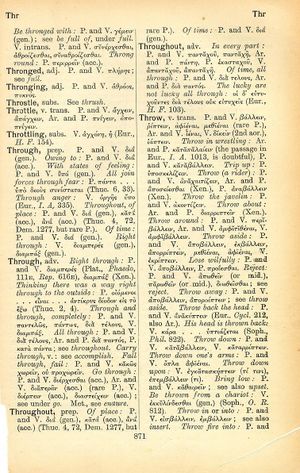through: Difference between revisions
ἑωλοκρασίαν τινά μου τῆς πονηρίας κατασκεδάσας → having discharged the stale dregs of his rascality over me
(CSV5) |
m (Text replacement - "<b class="b2">Phaedo</b>" to "''Phaedo''") |
||
| Line 20: | Line 20: | ||
'''adv.''' | '''adv.''' | ||
<b class="b2">Right through</b>: P. and V. [[διαμπερές]] (Plat., | <b class="b2">Right through</b>: P. and V. [[διαμπερές]] (Plat., ''Phaedo'', 111E, ''Rep.'' 616E), [[διαμπάξ]] (Xen.). | ||
<b class="b2">Thinking there was a way right through to the outside</b>: P. οἰόμενοι... εἶναι... ἀντίκρυς δίοδον εἰς τὸ [[ἔξω]] (Thuc. <b class="b2">2, 4</b>). | <b class="b2">Thinking there was a way right through to the outside</b>: P. οἰόμενοι... εἶναι... ἀντίκρυς δίοδον εἰς τὸ [[ἔξω]] (Thuc. <b class="b2">2, 4</b>). | ||
Revision as of 13:57, 7 August 2017
English > Greek (Woodhouse)
prep.
P. and V. διά (gen.).
Owing to: P. and V. διά (acc.).
With states of feeling: P. and V. ὑπό (gen.).
All join forces through fear: P. πάντα... ὑπὸ δεοὺς συνίσταται (Thuc. 6, 33).
Through anger: V. ὀργῆς ὕπο (Eur., I. A. 335).
Throughout, of place P. and V. διά (gen.), κατά (acc.), ἀνά (acc.) (Thuc. 4, 72, Dem. 1277, but rare P.).
Of time: P. and V. διά (gen.).
Right through: V. διαμπερές (gen.), διαμπάξ (gen.).
adv.
Right through: P. and V. διαμπερές (Plat., Phaedo, 111E, Rep. 616E), διαμπάξ (Xen.).
Thinking there was a way right through to the outside: P. οἰόμενοι... εἶναι... ἀντίκρυς δίοδον εἰς τὸ ἔξω (Thuc. 2, 4).
Through and through, completely: P. and V. παντελῶς, πάντως, διὰ τέλους, V. διαμπάξ.
All through: P. and V. διὰ τέλους, Ar. and P. διὰ παντός, P. κατὰ πάντα; see throughout.
Carry through, v.: see accomplish.
Fall through, fail: P. and V. κακῶς χωρεῖν, οὐ προχωρεῖν.
Go through: P. and V. διέρχεσθαι (acc.), Ar. and V. διαπερᾶν (acc.) (rare P.), V. διέρπειν (acc.), διαστείχειν (acc.); see under go. Met., see endure.

